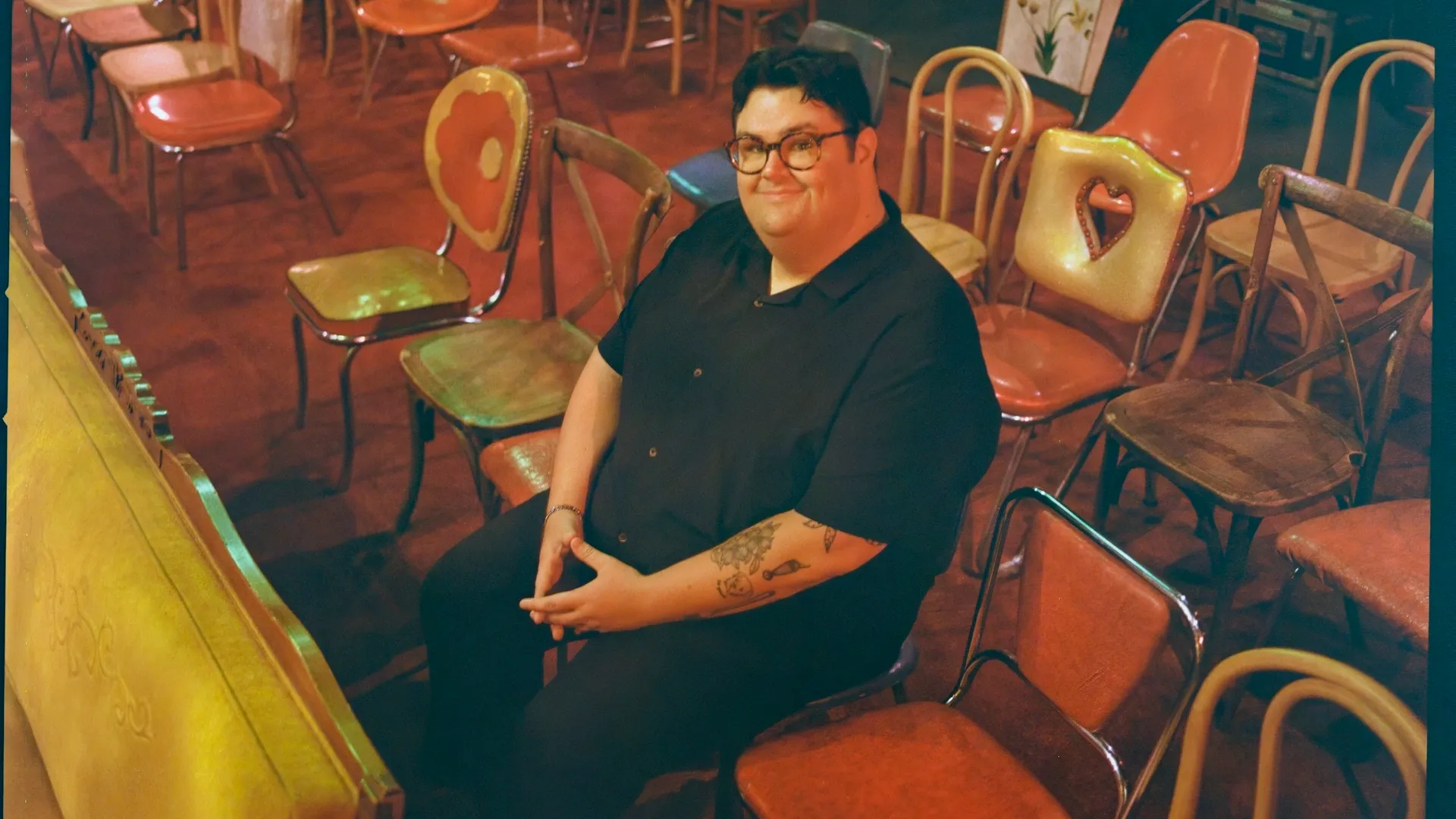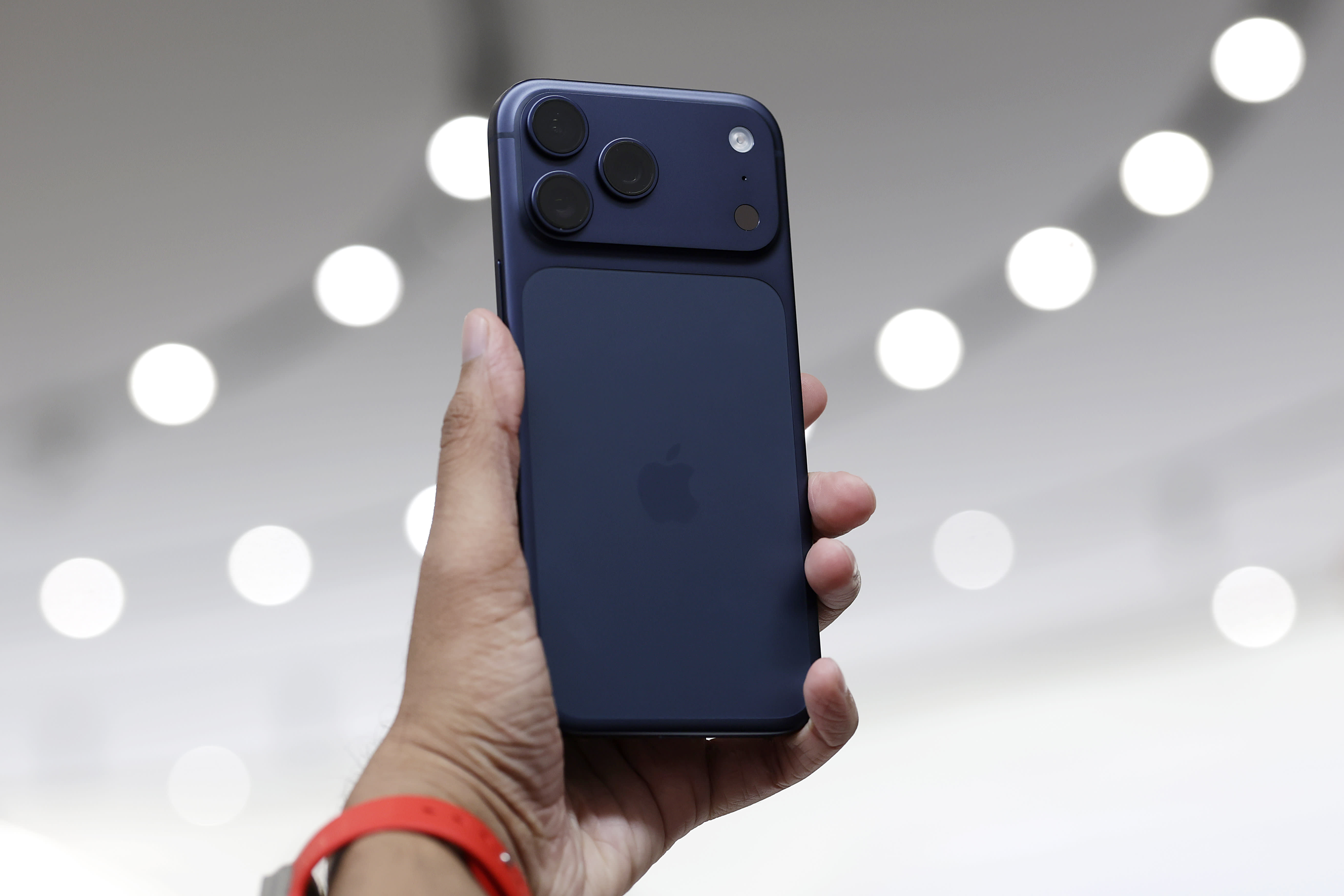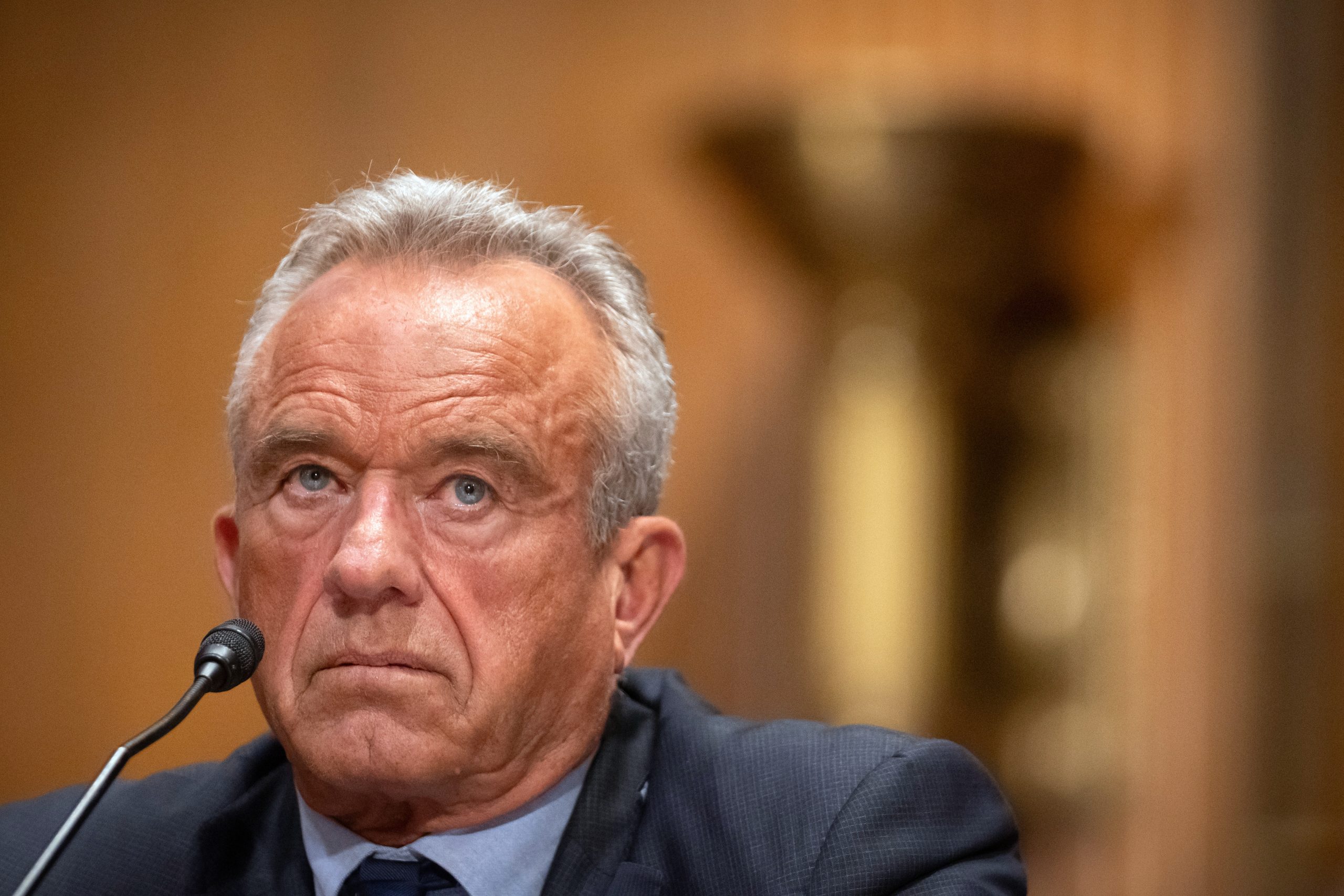By Matthew Roberson
Copyright gq

Caleb Hearon’s cousins have been calling him the F-word behind his back.
One of them is 10, Hearon explains. “He was like, ‘Cousin Caleb, can I ask you something?’ I said yeah. He said, ‘Does it bother you that we call you the F-word?’”
Hearon—a 30-year-old comedian, actor, writer, and online darling—is gay. You can see how this reveal would ring the alarm bells. “I was like, ‘I beg your pardon!’” says Hearon, sitting on a couch in his Brooklyn podcast studio. “They were like, ‘Oh, I told my teacher you were famous and she didn’t know who you were.’ I put it together and I was like, oh—that F-word. Okay. Your teacher in rural Missouri doesn’t need to know me actually. That’s great for me.”
While Hearon might not be famous enough to get on Midwestern schoolteachers’ radars, he is famous in the way that that makes him inescapable online. It all started for him the way it does for many comedians in the digital age, by posting bite-sized videos on the internet. Some classics include “pov: you’re listening to your friend vent when they’re clearly in the wrong”, and “the best man speech at straight weddings.” Clips from his stand-up shows and podcast episodes litter the timeline like little pots of gold, delivering humor tailor-made for the type of audience that might be college-educated and maybe canvassed for Zohran Mamdani, but also speaks fluent internet brainrot. His brand of hilarity—at times deeply personal and earnest, but also irreverent and sometimes frivolous—has earned him cameos in the television shows Overcompensating and Mr. and Mrs. Smith, and a role in the upcoming film The Devil Wears Prada 2. His stand-up chops also landed him a special on HBO, Caleb Hearon: Model Comedian, which debuts on September 19. If fame in 2025 is measured by how often someone appears on your various devices, Hearon is a burgeoning star.
He has also, at least, become famous enough to get the attention of MrBeast, the content monolith (born Jimmy Donaldson) with 435 million YouTube subscribers. In August, a Rolling Stone listicle ranking the 25 Most Influential Creators of 2025 put Hearon at #6, one spot ahead of MrBeast. MrBeast then fired off a since-deleted tweet asking how someone like Hearon—with a mere one million followers—could possibly be more influential than him. (MrBeast also seemed to conflate the music magazine with the British band, asking what he did to “piss off the Rolling Stones.”) Hearon’s fans immediately mobilized to defend him and antagonize MrBeast. A comment Hearon once made about his queer stans—“I have she/theys that are shooters”—instantly became a meme. Hearon, however, wasn’t sweating the drama.
“You know what’s funny? He reached out to me to apologize, which was nice of him,” Hearon says. “We chatted on the phone and I told him, ‘I thought it was funny, you were right.’” MrBeast also told him the Hearon hive was “brutal” and thanked Hearon for not fanning the flames. Hearon’s whatever, dude attitude applies to his own, well, fame; he can understand someone negging him if it gets a laugh. In fact, he says, “We need to bring back public beef. So many people talk that same kind of shit in private group chats. Put it on me. It was funny. It was also great for me. I got a bunch of followers out of it right before the special comes out.”
In that special, Hearon ping pongs between topics like being typecast by rental car employees, a form of intoxication he calls “Pink Panther mode,” and becoming more silly and whimsical with age. It’s a bouncy and light hour of Hearon sharing real-life stories (such as a Holocaust remembrance tour that took an unexpected turn for the comedic) and tackling the news of the day (there are plenty of pointed attacks on Republican officials). The jokes are killer, but simple things like Hearon’s mannerisms and vocal tics are side-splitting in their own right. Watching Hearon command a stage makes you want to hang out with him, for the laughs but also for his keen eye for the absurdity of our modern hellscape. And while many young Americans are jaded by a world seemingly beyond repair, Hearon is optimistic about humanity itself.
“I think my religion is my faith in people,” he says. “Let me just get it real crisp and clear. I believe in people. I really believe in us. I think we’re mostly good and want to take care of each other, actually, genuinely, in my soul. I think that stand-up as a job is about understanding and taking care of the audience, and hoping that maybe they come away from it also understanding me a little bit better, and having laughed because we were similar—or different!”
Within the same breath, Hearon—who is wearing a navy blue crewneck sweatshirt, short shorts, socked feet, and a trucker hat that reads “With peace & love”—will jump from an insightful thought about how stressful it can be to analyze your own art to a bit about how the leftist movement needs to spare a thought for public airplanes. “They’re making the seats smaller and smaller,” Hearon says, walking me through his experience on the Delta flight that delivered him to New York earlier in the day. “People are only getting fatter. I know because I’m a person and it’s happening to me. I hate it and I’m so mad about it. I was texting my friend who’s a tenant organizer. I said, ‘Technically this is a rented space for money. Can we work in the size of airplane seats into the tenant conversation?’”
Hearon grew up poor in the small river town of Chillicothe, Missouri, where sliced bread was invented, but lives in Brooklyn now, where we are currently convened on the fifth floor of an industrial building. It’s one of those September days where the weather is so perfect it tricks people into moving here. Hearon came to the borough after stints in Chicago, Los Angeles, and Kansas City. The sparse room we’re sitting in will soon become the permanent home of So True With Caleb Hearon, his chit chat podcast that’s a staple on the Spotify top 100 chart. There’s a flat screen mounted to the wall, a couch facing a window that overlooks a bus depot, and not much else. When I arrive, he’s streaming a DJ set on the TV (he later changes it to a mix of Waxahatchee songs). It’s a bit of a transitional period for Hearon, who is in the midst of going from niche celebrity on the world wide web to multimedia favorite. In addition to the Devil Wears Prada sequel, he’s also attached to the Lily Wachowski movie Trash Mountain, in which he is both the co-writer and lead actor. He tells me that he’s shooting three movies this year, “maybe more.” (Previously he has written for Human Resources, the spinoff of Nick Kroll’s raunchy cartoon Big Mouth; appeared in the music video for queer anthem “Silk Chiffon” by MUNA; and made a fruitless audition for Saturday Night Live. “I wish everyone well. Shout out to Lorne. He’s reading this.”)
As Hearon’s star has risen, he’s found himself subject to the online hate you might expect. But he’s not sure where some of these haters are getting their information. He mentions seeing multiple versions of a specific comment about how he—a man who’s largely built his brand on joviality and goof—has morphed into a “Regina George-type” or a “mean gay.” He concedes that he can be sharp, discerning, and direct, things that are often mistaken for malice. This, he says, is when the keyboard warriors start to worry him—when they run with a misguided or misinformed narrative. “I think that being on the internet is most difficult when the math doesn’t add up,” he says. “You’re like, wait, how the fuck did you get here? I saw someone the other day be like ‘Caleb’s so funny. It sucks that he’s a Zionist.’ I am not, and have talked so publicly, at length, about that not being the case!”
Hearon is pretty clear on his positions: He’s anti-billionaire, anti-landlord, anti-police; pro-Palestine, pro-trans rights, and pro-redneck progressivism, a term he coins in the special. (Many people, he says, have the right idea when it comes to things like gay marriage and other issues facing the LGBTQ community, but might use some outdated terms when talking about it.) The joy of being in the same room as Hearon is watching him effortlessly toggle between in-depth, educated social commentary and wisecracking. Sometimes the two blend together in a way that makes it hard to extract the real from the joke. Sometimes the twinkle in his eye or the cadence of his delivery give it away. Here’s a sampling of his current takes:
On politicians in the era of secularity: “Culturally I think it was better when our leaders had to at least pretend to be Christian. You know what I mean? I think that actually was going better for us than this thing that’s going on now.”
On deleting Twitter, the platform where he first gained notoriety: “I got my first writing jobs off Twitter. But I fucking hate [Elon Musk] so much. Old Twitter was great. I miss it all the time. I go in an alley where no one’s looking and fire off of a ‘POV, the barista was rude to you’ video or whatever the fuck I was doing.”
On the manosphere: “The optimization thing, I don’t know what that is…Like the 5 a.m. hit the gym, egg yolks. We got to invest. We got raw milk. We got to invest in raw milk while at the gym. These fucking freaks that are so put upon because, I don’t know, they’re not getting to date the three women they like or something? I don’t know what’s causing the upset. But it really is insane to watch some of these crazy optimizing psycho bros interact with real, normal human beings that are enjoying themselves. That would be my note to young men that are seeking this out: those guys are not happy. Don’t follow them!”
Hearon also weaves a few minutes about one of the most traumatic days of his life into the HBO special. In 2022, his father died unexpectedly while Hearon was on a trip with friends. Hearon describes his dad as a man who was hard to pin down ideologically, maybe not a great father, but ultimately good.
“I try not to take anything to the stage that I haven’t dealt with enough to not be raw about it,” he says, re-adjusting his position on the small couch we’re sharing. “I’ve never cried on stage talking about anything serious, not even my dad, which to me means I did the very good work of being ready to talk about it. I don’t think the stage should be therapy, but I do think convening with strangers about ideas is the most special thing that we do.”
On my way out, Hearon offers me a box of Sharpies and asks me to sign the massive pillar that bisects the room. I find some space under the names of a few comedians I recognize. Emerging onto the street, I think about one thing we discussed: How comics, who have to be so on when they’re performing, are thrust back to the coldness of reality as soon as they put the microphone down. Days later, combing through the transcript, I find his eloquently-stated thoughts on the matter. In classic Caleb Hearon fashion, they’re a telling summation of how his brain works, punctuated with a great line: “Comics talk about this a lot, getting off stage and feeling so sad. I’m not experiencing that. I don’t really derive worth from it. I like being good at it. If I have a bad show, it’s upsetting to me, but I don’t feel like I’m unlovable and everything is dark. I’m like, oh, I just had a weird night tonight. No fucking worries.”



